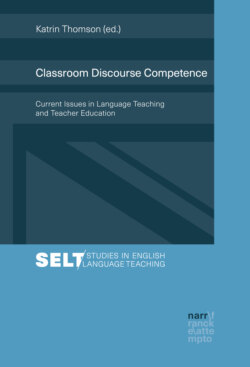Читать книгу Classroom Discourse Competence - Группа авторов - Страница 11
На сайте Литреса книга снята с продажи.
1 Introduction: (Language) Teachers’ Professional Competence
ОглавлениеThe past ten or so years have seen a marked shift from conceptualizing, assessing and evaluating learner competences towards defining and researching teachers’ professional competences – especially within the academic fields of general pedagogy and education (cf. König 2014: 22), but also increasingly so in individual subject domains such as TEFL. This ever-growing interest in teachers’ professional competences is, for instance, reflected in scholarly discussions about how ‘professional competence’ can be defined and conceptualized. Aiming to systematically capture those factors and aspects that shape and influence teachers’ professional competence, generic competence models have been developed (e.g. Baumert/Kunert 2006, Blömeke 2011, Blömeke et al. 2015). These are based on two general notions: (1) ‘Professional competence’ is a highly complex, multidimensional construct. It develops gradually and along a continuum. (2) Teachers’ cognitive resources (i.e. different types of knowledge), affective dispositions (i.e. teachers’ attitudes, beliefs, values etc.) and skills (i.e. teachers’ abilities to strategically and adequately use their intrapersonal resources in specific classroom situations) need to be considered as core dimensions of teacher professionalism (cf. Baumert/Kunter 2006: 481).
There is widespread consensus that teachers’ professional knowledge plays a crucial role in gaining professional competence. Thus, in seeking to further define teachers’ complex professional competence in the school subjects they teach, much attention has been directed to conceptualizing and researching teachers’ professional knowledge and its subtypes. In the scholarly discourse in Germany, Shulman’s (1987) taxonomy with its distinction between content knowledge (CK, Fachwissen), pedagogical content knowledge (PCK, fachdidaktisches Wissen) and general pedagogical knowledge (GPK, allgemeines pädagogisches Wissen) has proven to be most influential in the past few years (see Fig. 1).
Fig. 1:
Teachers’ Professional Knowledge (based on Shulman 1987)
Here, Shulman’s work has prompted researchers of various academic disciplines to specify (and test) these different knowledge repositories. With regard to TEFL and EFL teacher education, the research projects by Roters et al. (2011), Roters et al. (2013) and Kirchhoff (2016, 2017) are particularly noteworthy as they have made a major contribution to gaining a more precise understanding of what constitutes EFL teachers’ professional knowledge. Research along these lines is increasingly developing in Germany (cf. Legutke/Schart 2016: 13).
For a more differentiated and comprehensive exploration of EFL teachers’ professional competence, however, other components than Shulman’s categories have to be taken into account as well. This includes, first and foremost, teachers’ classroom discourse competence (CDC) which is considered here as a key competence of foreign language teachers. Going far beyond the mere notion of teachers’ L2 proficiency, CDC denotes language teachers’ competence “to structure and organize classroom discourse through professional use of the L2 (and other languages) in FL teaching and learning contexts. Language teachers’ (verbal) actions and classroom discourse tasks, then, are carried out purposefully and in ways that promote student learning. Moreover, teachers’ discoursal practices manifest themselves in classroom context-adapted decision-making, which – among other factors – is based on extensive professional knowledge, pedagogic reflections and discourse awareness.” (Thomson, “Introduction”, this volume).2 Such an understanding of CDC clearly implies that mastering classroom discourse tasks in the foreign language classroom requires more than just general target language proficiency. There is a pedagogical, i.e. professional dimension to CDC, which however has received too little attention in the scholarly discussion so far.
